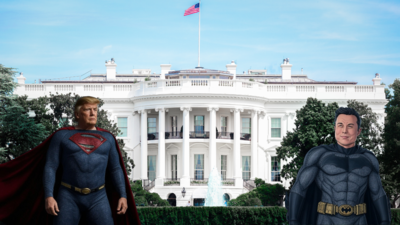
"Will the real Slim Shady please stand up?" Eminem’s iconic line feels tailor-made for 2024’s political drama, where the United States finds itself asking: Who is really running the country? Is it Donald Trump, the president-elect ready to return to the White House? Or is it Elon Musk, the tech billionaire whose tweets are reshaping Washington in real time?
As the US barrels toward a government shutdown, the line between influence and authority has never been blurrier. Musk’s five-word critique of a bipartisan budget deal—"This bill should not pass"—has Democrats accusing him of wielding presidential power. Meanwhile, Trump’s official endorsement of Republican resistance reminds everyone who still wears the crown.
How Musk’s Tweet Derailed the Budget Bill

The stage was set for a rare bipartisan victory. House Republicans, led by Speaker Mike Johnson, had hammered out a sprawling 1,500-page bill with Senate Democrats to keep the government funded until March 2025. It included $100 billion for disaster relief, $10 billion in farm aid, a crackdown on predatory hotel fees, and a modest pay raise for lawmakers.
But then Musk, who has been tapped to co-chair Trump’s proposed
Department of Government Efficiency
(DOGE), intervened. Using his platform on X (formerly Twitter), Musk fired off a scathing critique of the bill, calling it “one of the worst bills ever written” and warning lawmakers that a vote in its favor would be political suicide. “Any member of the House or Senate who votes for this outrageous spending bill deserves to be voted out in two years!”
In over 150 separate posts on X, starting before dawn on Wednesday, Musk urged Republicans to abandon a bipartisan spending deal intended to avert a government shutdown over Christmas. He threatened political retribution against anyone supporting the sprawling bill backed by House Speaker Mike Johnson, who reportedly called Mr Musk on Wednesday to request that he stop posting about the legislation. His words carried weight. Conservative Republicans, already uneasy about the bill, began peeling away their support. A last-ditch effort to replace the bipartisan agreement with a stripped-down Republican alternative failed in the House, and now the government is hurtling toward a shutdown at midnight Friday.
Karoline Leavitt: “President Trump Is the Leader of the Republican Party”

Amid the chaos, Trump’s camp was quick to reassert his authority. Karoline Leavitt, Trump’s incoming White House press secretary, sought to clarify who’s really calling the shots. Speaking to Business Insider, Leavitt said, “As soon as President Trump released his official stance on the CR (continuing resolution), Republicans on Capitol Hill echoed his point of view.” She doubled down, adding, “President Trump is the leader of the Republican Party. Full stop.”
Trump’s endorsement of Republican resistance has indeed rallied his party, but Musk’s role in shaping the conversation remains undeniable. With his tweet, Musk didn’t just critique the bill—he shifted the political calculus, forcing lawmakers to reconsider their positions.
Why Democrats Are Calling Him ‘President Musk’
Democrats aren’t buying the narrative that Trump is solely responsible for the impasse. Senator Bernie Sanders didn’t mince words, referring to Musk as “President Musk” in a fiery Senate speech. “When did the wealthiest man in the world get veto power over our government? This is democracy, not some billionaire’s boardroom.”
Sanders’ criticism reflects broader concerns about Musk’s growing influence. As co-chair of DOGE, Musk is already positioned to play a major role in reshaping federal operations under Trump’s second term. But his ability to derail legislation with a single tweet has raised alarm bells across the political spectrum.
Mike Johnson and the Musk Connection
Adding to the controversy, Speaker Mike Johnson revealed that he had been in direct communication with Musk during the legislative process. “I’ve been in touch with Elon,” Johnson admitted, praising Musk’s insights on fiscal responsibility.
While some Republicans see Musk as a valuable ally, Democrats argue that his influence undermines democratic norms. “We’re letting a billionaire dictate our legislative priorities,” one House Democrat fumed.
The Trump-Musk Dynamic
For his part, Trump has remained largely silent on Musk’s outsized role in the budget debacle. Some speculate that Trump sees Musk as a useful ally whose populist rhetoric aligns with his own anti-establishment message. Others wonder if Trump views Musk as a potential rival—a man whose ability to command headlines and sway public opinion rivals even his own.
What This Means for Democracy
The Musk-Trump saga isn’t just about a budget bill; it’s a referendum on power in the digital age. Musk’s defenders argue that his critiques are a necessary check on Washington’s inefficiencies. His detractors, however, warn that his unchecked influence sets a dangerous precedent where democracy is at risk of being overshadowed by the will of unelected billionaires.
As the government teeters on the brink of a shutdown, one thing is clear: the battle for influence in Washington is no longer confined to elected officials. Musk’s tweet may not have come with a presidential seal, but its impact was undeniably presidential.
So, will the real president please stand up? Or are we already looking at him—smartphone in hand, crafting the next 280-character directive?

 1 day ago
4
1 day ago
4










 English (US) ·
English (US) ·